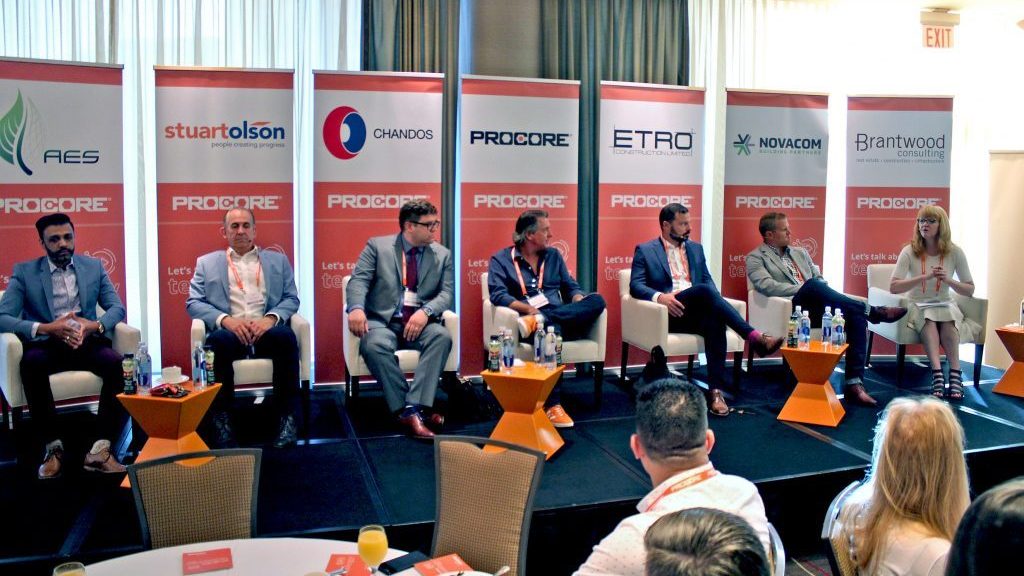A panel of industry experts sees the future of construction as a mix of new technology and new values.
A discussion panel titled Let’s Talk About Technology, held at Vancouver’s Terminal City Club and presented by construction software firm Procore Technologies gathered together several different firms who have moved to adopt technological innovation to, as panel moderator and Brantwood Consulting managing partner Helen Goodland said, “the last pre-industrial sector.”
Vancouver-based ETRO Construction principal Mike Maierle said the industry has come some way in the last five years.
“We have BIM, cross laminated timber and Passive House to a far greater extent than before. Five years ago, I never thought I’d be hiring an innovation manager,” he said.
“But we’re still a very unsophisticated business, dealing with subtrades that have two people working off a spreadsheet in an office.”
Procore Technologies CEO Tooey Courtemanche said “the human element is what’s pulling the industry forward” and added people much younger than himself are the ones bringing technology into the construction industry.
Novacom Building Partners president Brandon Drewlo echoed Courtemanche and said demographics are what’s driving an accelerating push to adopt technology.
“There are people who have done things the same way for 30 years and don’t want to change, and those who say ‘this is broken.’ The youngest people entering the industry won’t accept ‘this is just the way we’ve always done it’,” Drewlo said.
While construction has traditionally seemed to be averse to technological progression, he added there is also a phenomenon of “tool seduction” where companies adopt new tools without serious thought.
“Those companies aren’t asking what works onsite and what makes them more efficient,” he said.
Collaboration, Drewlo said, is another area that’s seen progress.
“We didn’t collaborate in the past, perhaps due to a perception of scarcity. But we have adopted a ‘rising all boats’ philosophy,” he said.
Courtemanche said similar behaviour used to occur in information technology (IT), but that mindset has changed as the industry realizes “the competitive advantage is the people you hire, attract and retain.”
The other shift, he added, is the use of open data to one’s competitive advantage.
People are turning down work because it doesn’t match their values
—��Sunny Ghataurah
AES Engineering
��
“People now want to anonymize their own data, share it with Procore, and then benefit from the resulting analytics that the ‘wisdom of the crowd’ brings,” Courtemanche said.
Shifts in attitude as well as technology are bringing more young people into the industry, the panel agreed.
Stuart Olson vice-president of innovation Clint Undseth said younger workers are looking to work with his firm because the company holds sustainability as a core value.
“Twenty to 30 per cent of landfill is construction, which is our business. That bothers me. But sustainability is taking on a life of its own, and data and zero waste policy are coming together,” he said.
“Three years ago, zero waste wasn’t a thing in our industry and now it’s a rallying cry at the grassroots level.”
Chandos Construction president Tim Coldwell agreed sustainability is a rising force in the industry and that change will come from the bottom up.
“There’s a real lack of leadership in the construction industry, especially at the general contractor level. Without municipal rulings, people sit back and wait for someone else to solve the problem,” Coldwell said.
“We’re going to provide some leadership here and not wait for the City of Vancouver to tell us to do it.”
Another changing aspect of the industry is a rising, though still small, presence of women in construction.
Courtemanche credited increased STEM (science, technology, engineering and math) education at younger ages as key to bringing women into construction, and added societal attitudes have shifted to the point where there isn’t as much of a stigma towards the industry.
“We’re seeing more diverse groups of people coming into the industry because the stigma isn’t there, except in the case of parents of those interested in entering the industry, who sometimes still hold those stigmas,” Courtemanche said.
“On the consulting side, it’s tough to find people, and that’s a general industry challenge,” said AES Engineering president Sunny Ghataurah. “But we’ve been lucky with non-traditional hires from the gaming industry and other fields.”
Younger hires also want the firm they work for to match their outlook and values.
“People are turning down work because it doesn’t match their values. It can’t just be about profit and it can’t be at the expense of others,” Ghataurah said.










Recent Comments
comments for this post are closed